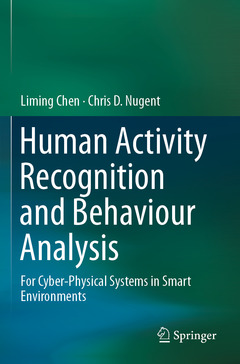Description
Human Activity Recognition and Behaviour Analysis, 1st ed. 2019
For Cyber-Physical Systems in Smart Environments
Authors: Chen Liming, Nugent Chris D.
Language: English
Subject for Human Activity Recognition and Behaviour Analysis:
Approximative price 137.14 €
In Print (Delivery period: 15 days).
Add to cartPublication date: 08-2020
255 p. · 15.5x23.5 cm · Paperback
Approximative price 137.14 €
In Print (Delivery period: 15 days).
Add to cartPublication date: 06-2019
Support: Print on demand
Description
/li>Contents
/li>Biography
/li>Comment
/li>
The book first defines the problems, various concepts and notions related to activity recognition, and introduces the fundamental rationale and state-of-the-art methodologies and approaches. It then describes the use of artificial intelligence techniques and advanced knowledge technologies for the modelling and lifecycle analysis of human activities and behaviours based on real-time sensing observations from sensor networks and the Internet of Things. It also covers inference and decision-support methods and mechanisms, as well as personalization and adaptation techniques, which are required for emerging smart human-machine pervasive systems, such as self-management and assistive technologies in smart healthcare. Each chapter includes theoretical background, technological underpinnings and practical implementation, and step-by-step information on how to address and solve specific problems in topical areas.
This monograph can be used as a textbook for postgraduate and PhD students on courses such as computer systems, pervasive computing, data analytics and digital health. It is also a valuable research reference resource for postdoctoral candidates and academics in relevant research and application domains, such as data analytics, smart cities, smart energy, and smart healthcare, to name but a few. Moreover, it offers smart technology and application developers practical insights into the use of activity recognition and behaviour analysis in state-of-the-art cyber-physical systems. Lastly, it provides healthcare solution developers and providers with information about the opportunities and possible innovative solutions for personalized healthcare and stratified medicine.
Introduction
AR Approaches and Methods
Knowledge-Driven Approaches to AR
Hybrid Approaches to AR
Time Window-Based Data Segmentation
Semantic-Based Data Segmentation
Temporal Reasoning for Complex Activity Recognition
Fuzzy Logic for Complex Activity Recognition
Semantic Smart Home and Technology Infrastructure
Prototype Systems
Provides a comprehensive and systematic introduction to activity recognition
Presents an in-depth discussion on the knowledge-driven approach to activity recognition
Proposes a systematic methodology, along with a scalable framework and extensible technology infrastructure
Offers a sample technology solution for smart healthcare
Reviews the latest, state-of-the-art research, covering aspects of both methodology and application
These books may interest you

Data Analytics for Smart Cities 135.96 €


